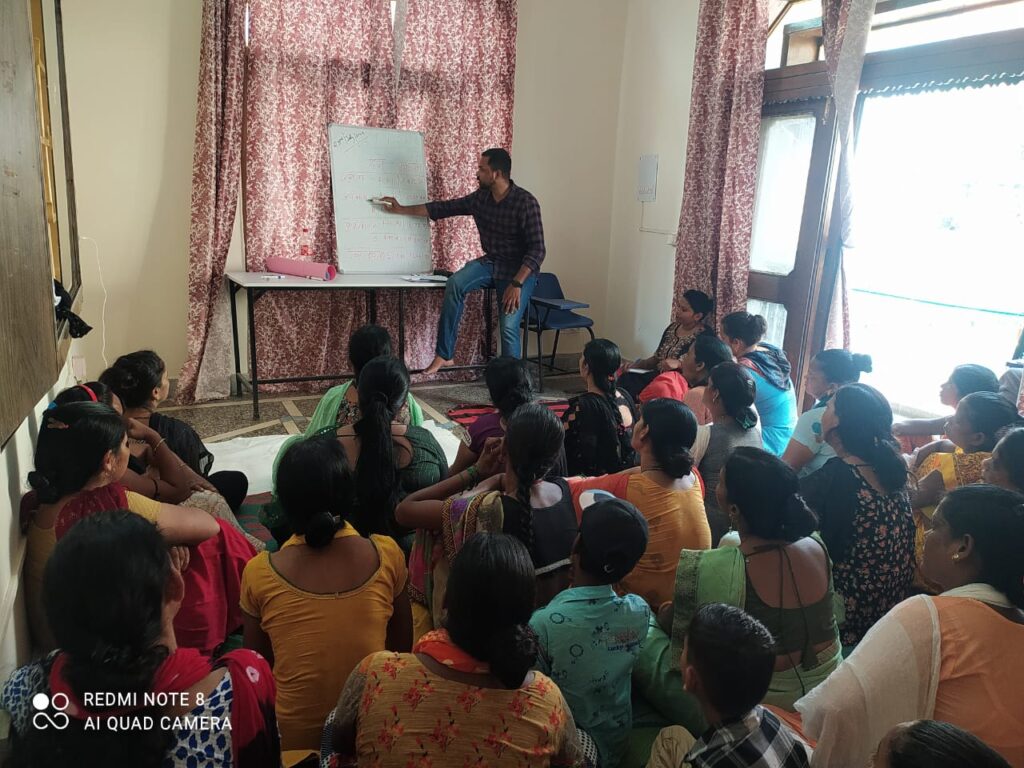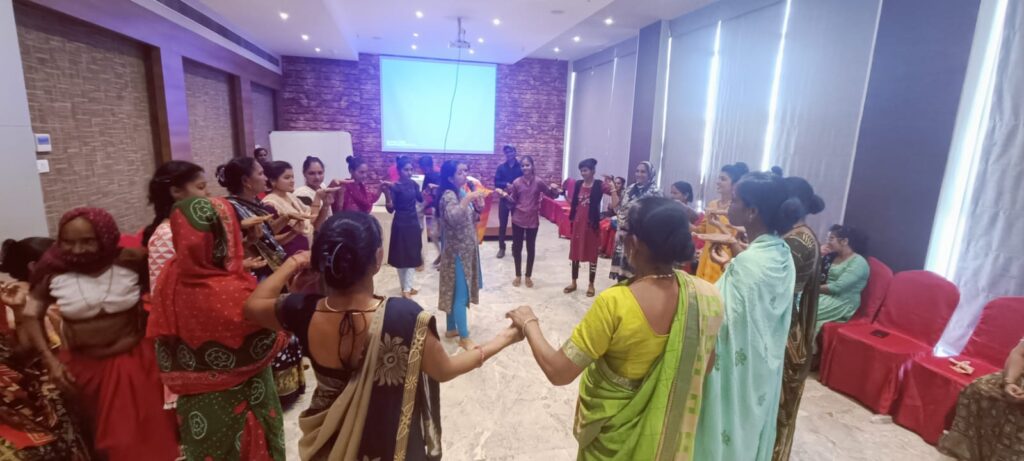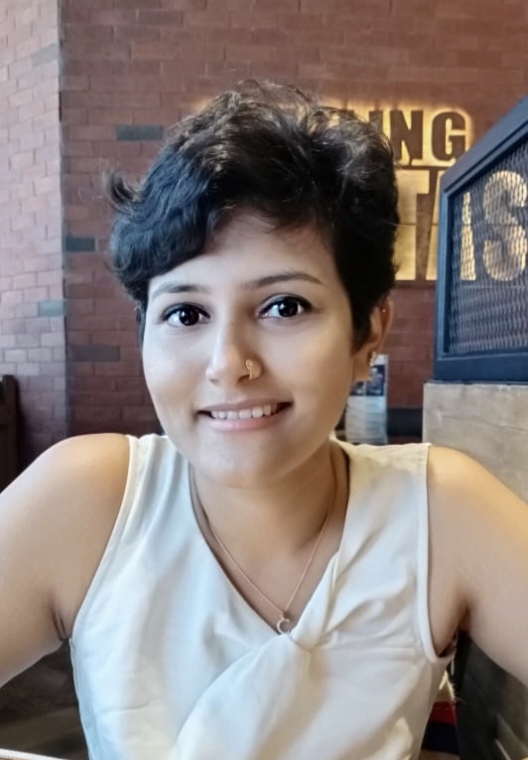Interview with Ashmita Sharma, Society for Labour & Development (SLD) India
Continuing our interview with new WomenStrong partner Executive Director Ashmita Sharma of Society for Labour & Development (SLD) India
SLD India also supports domestic workers, who historically have been undervalued, underpaid, and underserved. Their contributions to society are unquantifiable, though more recent efforts globally and in some local contexts are aiming to assign a value. What do you see as the value of domestic work, and why is it important to raise awareness and show that value?
Ashmita: In the informal sector, we have been extensively working with domestic workers since 2012. Our Gharelu Kamgar Sangathan program has been working tirelessly to mobilize and organize domestic workers in Gurgaon, Haryana. Since our intervention, domestic workers have started addressing their problems as a group and recognizing the value of their work.
For a long time, when we questioned them during our trainings and capacity building exercises with, “Do you consider yourself as workers?” They did not. They had very little idea of the value of their work. Additionally, their workplace is also very informal, unregulated, and scattered. For workers in the garment industry, there is a sense of comfort that everyone is working in the same organized environment. However, for domestic workers it is quite the opposite, giving workers very little chance of actually getting together and debating their problems on a single platform. That is why we created the GKS programme, which we are currently rolling out across the Delhi NCR region.
Recently, we have started conducting focused group discussions with domestic workers. Through these conversations, we are attempting to evaluate not just the nature of tasks they are performing in the households, but also the problems and difficulties they face on a daily basis at work. Through this exercise, we are trying to get domestic workers to form a collective and to strengthen their voice at work.
Eventually, SLD’s role will be limited to being a facilitator. We do not want to take over the entire movement of domestic workers; rather, we want them to eventually become autonomous and have their own constitution, so that they can support and maintain themselves in the long run. The past few years have seen a rise in women’s collective action. The idea is to support these women to explore their potential in different aspects of life. Because the struggle for gender equality will not be successful until women have economic security and self-sufficiency. This is difficult and challenging, but I think these piecemeal changes will show us the way towards a bigger transformation in the future.
This is crucial because for those of us who work in formal workspaces, domestic workers subsidize our work. The employers’ residences serve as their workplaces. They simply make our lives easier and more convenient. Nevertheless, we are unable to contribute value to the job that they are performing. You know, in addition to being unorganized, their employment also poses significant risks. They are not only low-paid, but they also suffer various forms of violence and discrimination at the workplace, with very limited or no access to grievance mechanisms. Through our program, we are trying to support domestic workers [in reclaiming] their space. Our objective is to restructure the program so that we may seek sustainable solutions that would allow domestic workers to manage the program by themselves; a program that would be by and for domestic workers.

Ashmita, SLD India emphasizes the importance of knowing, establishing, and upholding rights – of workers, migrants, women. This type of work has been going on for centuries. While we have seen change over that time, there has also been significant pushback. Why do you think it is so difficult to bridge rights-based gaps?
Ashmita: I would not say that there are a lot of organizations working towards the wellbeing of workers in the labor rights space. One thing I’ve seen is that whenever you try to bring about change, there is a backlash that serves as a wake-up call. You are aware that some of the work you are doing in this sector is difficult, and you are attempting to bridge existing gaps – not only in the field of labor rights, but when you talk about labor rights, you are inevitably talking about the rights of women workers because gender is an important of the labour framework.
Human rights due diligence has emerged as a concrete tool for identifying gaps in human rights protections and working towards change, and that is very important for us to acknowledge and adopt when we are devising our strategies to be implemented in the labor rights field. When we talk about sustainability, climate change, and human rights, we see that they still tend to be built mostly in silos as separate from each other. I think it’s very important that we try to focus on the areas of convergence. It is very important for us to identify and recognize the intersectional work towards common goals. Human rights is not very different from the concept of sustainability or climate change. They’re all interdependent; when we protect one, we promote the other.
Today, there is a tremendous push to shift away from a rights-based approach and toward more of a service delivery model, a mechanism through which social benefits and programs are given to the poor and needy. SLD is attempting to achieve the correct balance in order to remain relevant in an ever-changing sociopolitical setting. How do we keep working while maintaining our focus and carrying on the vital job we’ve been doing for years? It is, indeed, really difficult.
Where have you seen progress?
Ashmita: I think the progress is that we’ve been able to cooperate and dialogue with a lot of stakeholders working in this space — be it civil society organizations or women’s organizations or workers’ organizations or industries, for that matter. We’ve been able to bring businesses to the table, and the fact that we’ve been able to engage with suppliers to support implementation of ethical and best practices in the supply chain is something that I see as progress, and that is also something that gives me hope, which was not the case four or five years back when we were working in the same field with the same set of workers and business houses.
And over the years, more and more workers have become associated with us, which I see as a case of trust-building, in some sense. You know, both ways. I know it’s challenging, but these are some things that give me hope and keep us going.
In the next few years, what will SLD India’s work look like? What are your aspirations for workers across industries and at home?
Ashmita: While SLD will continue to work towards the welfare of workers in the garment, seafood, and leather industries — along with domestic workers and migrant workers, with a special emphasis on women workers — we hope to see more proactive steps from the industries, governments, and various authorities taking a deeper cognizance of the larger wellbeing of workers. While most industries know the critical role that grassroots workers play in their production hubs, they need to recognize this, not only through adequate compensation but also by protecting and promoting their rights in the workplace, which is critical.
Furthermore, the welfare of women workers, prevention of numerous forms of harassment in their workplaces, is also critical. Correct and just redressal of grievances is also needed. Therefore, to answer your question in short, at SLD, we aspire for a future where the aspirations of workers are met, while at the same time, industries thrive; and where going to work feels safe and does not overwhelm one with a sense of toil. Ethics and social sustainability should form the core of any industry’s values, and that is what we envision and hope to see in the near future.

Ashmita, the work you all do at SLD India is challenging and also more important than ever. With that in mind, what gives you hope?
Ashmita: I agree with you that the work that we do is challenging, and yet it is very important. But then again, individuals like us, in organizations such as ours, we have set out on a mission to take on these challenges and try and make a difference to the lives of hundreds and thousands of people.
For development practitioners like us, when we pour in our time, our energy, expectations, and hope into the movement, we are bound to face a wave of rejections, which at times can be very disempowering, I must say. But it also means that something is happening. We are inspiring change. – Here is why I’m more excited than ever to be engaged in this fight. Also, there’s a sense of achievement that you feel when you’re able to execute a project or a task impactfully, with both the industries as well as the government acknowledging your work and thereafter implementing corrective paths and changes. These things give me hope.
Today, people — that is, the common man — are aware of ethical practices. I just want to see a growing sense of common responsibility by society towards the workforce; people who make our lives easier with each passing day. Hope, at the end of the day, gives us the energy to continue striving for change towards a better world.
Thank you so much for your time today, Ashmita. We appreciate you and the work of SLD India. As we wrap up, do you have any final thoughts or inspirational words for those who are trying to create social change?
Ashmita: I would like to recite two or three lines from Maya Angelou’s “Still, I Rise.” She has been my driving force and my source of inspiration, and I’m sure everyone out there trying to make a change has somebody that they look up to. And I would say follow your dream, your vision, and look beyond the hardships and the pain. There is, and always will be, a silver lining. So, I would like to use a small quote from Maya Angelou:
Just like moons and like suns,
With the certainty of tides,
Just like hopes springing high,
Still I’ll rise.
About Ashmita Sharma:

Ashmita earned her Master of Philosophy degree in Women’s Studies from the Tata Institute of Social Sciences in Mumbai and received the Professor Chhaya Datar Award for her research, “Experiencing Widowhood in Vrindavan.” Prior to her role as Executive Director at SLD India, Ashmita served as Lead for Research, Training, Communication. Before moving to SLD India, Ashmita served as a curriculum developer in the Ministry of Human Resource Development (MHRD). Ashmita’s work is focused on the interdisciplinary perspectives of gender and labor, and she has contributed to numerous journals on the subject. Through her work, Ashmita aspires to reach large audiences, not only to improve the working conditions of workers, but also to bring about cordial and mutually respectful relationships between workers and industries.
More About the Society for Labour & Development (SLD) India:
SLD India was founded in 2006 under the Indian Trusts Act, a law in governing private trusts and trustees. The Act was established at a time of rapid growth around India. While wealth and prosperity grew exponentially, these benefits were not trickling down to the working class and socially disenfranchised communities. Very often, these communities were deliberately denied basic human and civil rights. It was in this atmosphere that SLD India was established to support initiatives for labor rights and human rights. For more information, please visit SLD’s website.
Related Blogs and Stories:
About WomenStrong International
WomenStrong International provides trust-based funding, capacity strengthening, and a peer learning community to grantee partners addressing some of the most critical needs of women and girls: keeping girls in school, accessing lifesaving reproductive health care, preventing gender-based violence, and creating pathways to economic security. Learn More